App store optimization (ASO) is a bit of a mystery for many SEOs. So, let’s start with the basics.
While SEO is geared toward improving website rankings on search engines like Google,
ASO focuses on optimizing mobile apps for stronger visibility and performance within the Apple App Store and Google Play Store.
But there’s a lot of research and strategy that SEOs can carry from organic search into ASO campaign research.
By understanding how some critical SEO research components translate into ASO planning – and implementing them effectively into your app strategy – you can improve your chances of achieving stronger app store visibility, stronger app visibility on Google and increased downloads.
Some SEOs put organic search into two simple buckets: on- and off-page SEO. I’m going to do something similar and break down my SEO and ASO synergy tips into two different areas of opportunity:
- App landing pages: The page on your website dedicated to featuring your app.
- Store listing pages: Your Apple App Store and Google Play Store listings.
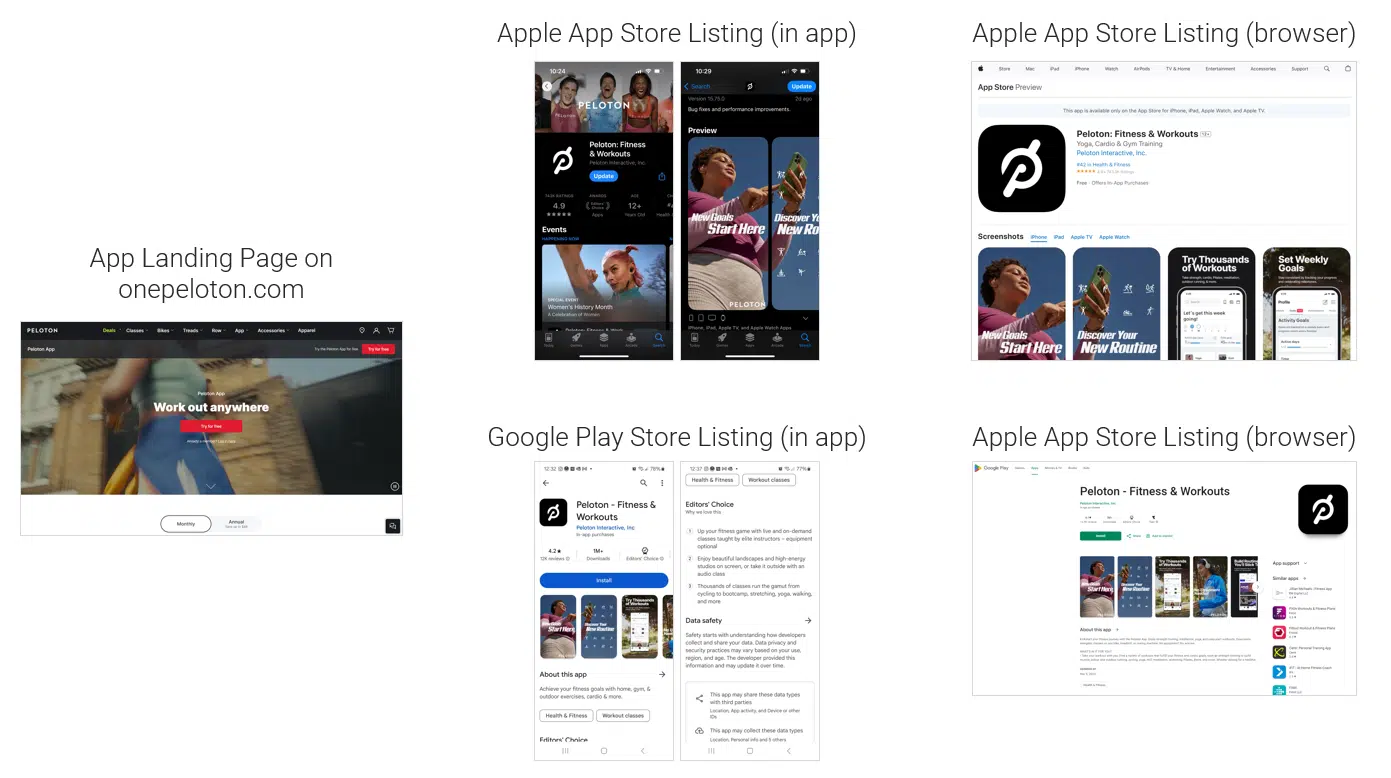
Discover ways to leverage your strategic SEO thinking and research skills for ASO below.
App landing pages
We’re all familiar with landing pages and their importance in organic search.
However, many brands underestimate the importance of dedicated landing pages for their app when it comes to ASO. They simply add Apple App Store and Google Play Store buttons to pages across their site. These brands miss out on the benefits of creating a dedicated app landing page.
Let’s look at four reasons why creating an app landing page is important and how to use your SEO skills to maximize your ASO success and learnings.
1. Highlight your value proposition
Even if you’re an app-based business, your website is an essential touch point in your customer’s journey. It’s an opportunity to have a dedicated place for website users to discover your app, learn about its features and value and easily download it.
Here are a few examples from Vrbo, KAYAK and SoFi where they highlight the benefits of using their apps:



Your website is also a great place to highlight some curated social proofing, such as app awards, reviews and testimonials. This is an essential strategy in today’s E-E-A-T-based search world.
Here’s an example from Bank of America, which has a well-executed app landing page:
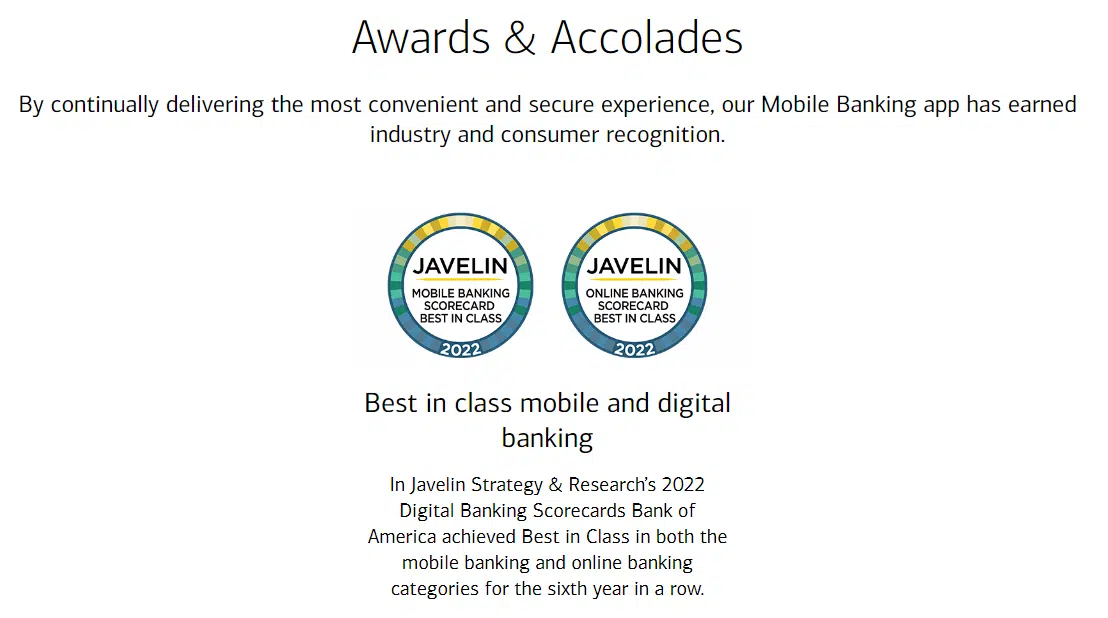
Here’s another example from Priceline:

2. Test and learn
Leverage your app landing page to run tests and gather helpful data.
How?
Make feature descriptions clickable so you can track clicks or use heatmapping software like CrazyEgg or Hotjar to understand which features viewers are most interested in.
You can also A/B test landing page copy and layouts and use those text and creative insights to inform your app store metadata and app creative.
3. Own your branded SERP results
An app landing page gives you another owned asset that can take up valuable SERP real estate for branded queries.
For example, there’s a clear difference between SERP real estate for brands like Centr and Tone It Up (which do not have an app landing page) and Peloton (which does).
For the queries “Centr app” and “Tone It Up app,” Centr and Tone It Up currently only own organic positions 1-4 with their owned properties, whereas Peloton owns positions 1-5 for “Peloton app” with the fifth website ranking being their app landing page.
Why does this matter? If you open the fifth ranking result for the query “Centr app,” which is Reddit, one of the first things you see is a negative review:

Perhaps if Centr had a dedicated app landing page, they could outrank the negative press they’re getting on Reddit.
4. Internal linking
Internal linking is one of the most effective and under-appreciated SEO tactics. It’s low lift, easy to implement and we typically see great results from internal linking at our agency.
That’s why it’s also a tactic you should use to boost your ASO campaigns and app page authority.
If you want your app to build authority and visibility for competitive non-branded terms, internally linking to your app landing page is a great way to help build those signals.
Here’s an example of this on Western Union’s blog:

This strategy helps build topical authority for Western Union’s app within the competitive money transfer space.
Get the daily newsletter search marketers rely on.
App listing pages
App listing pages display each app’s features and other information as you browse the Apple App Store and Google Play Store. These pages are even more important to your ASO strategy than your app landing page, as their contents directly impact your app store rankings. They’re what a prospective customer will see before clicking to download your app.
They contain several key elements, like ratings and user reviews, previews of what your app looks like and your app’s metadata. Let’s look at four ways your SEO skills can maximize your app listing page’s performance.
5. Research and competitive analysis
Tools like Ubersuggest, Ahrefs and Semrush are useful for your ASO strategy, just like SEO. These platforms can help you check organic traffic, keywords in your Apple App Store listing pages and backlinks to your Google Play store listing.
For example, here are the overview stats from Ubersuggest for Western Union’s Apple App Store listing page:
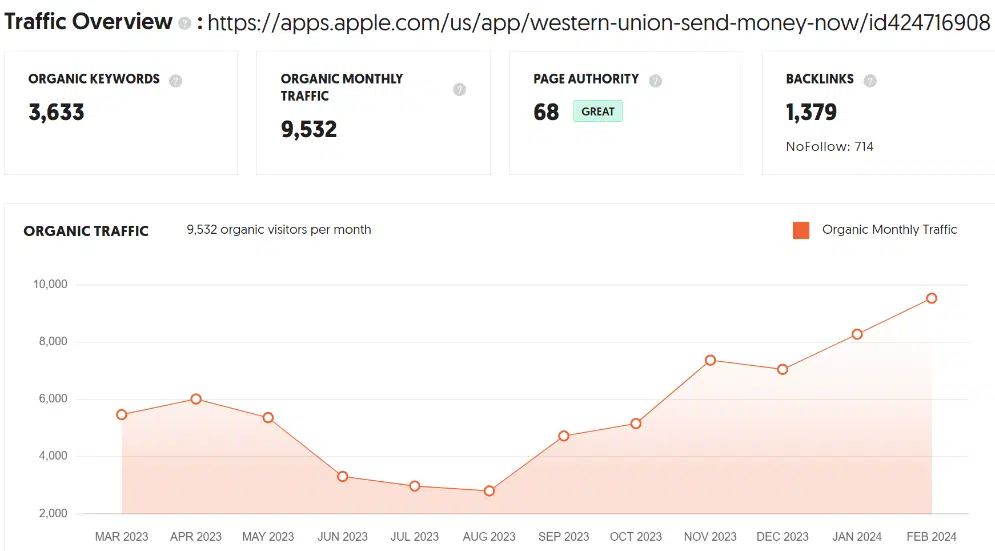
Here are the same stats for a competitor, Wise, shown on Semrush:
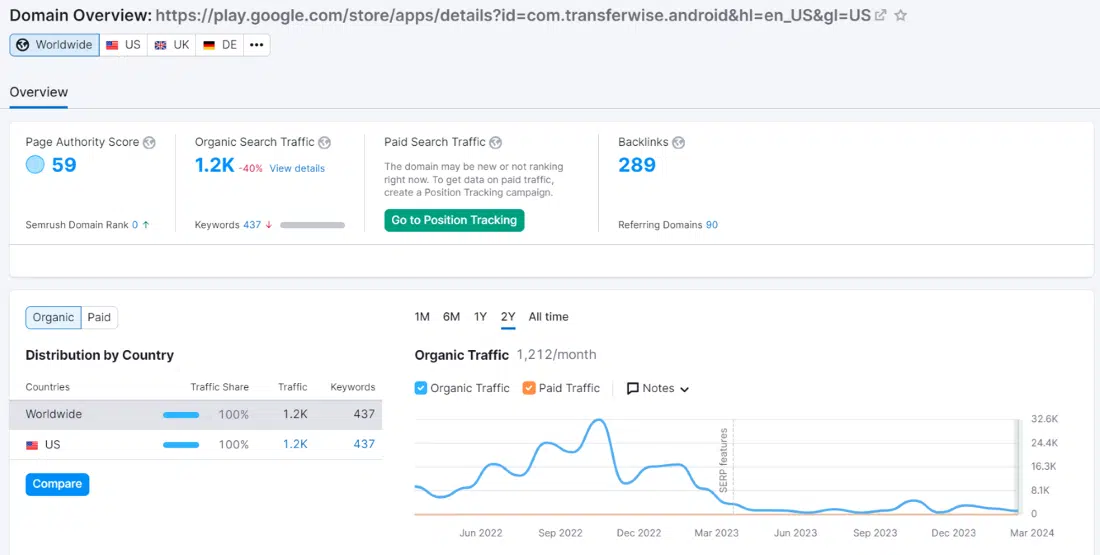
Why is this information helpful?
It gives you the data you need to understand how your app listing pages are performing on Google vs. competing apps so you can adjust your strategy if necessary.
Whether you’re working on an SEO or ASO campaign, it’s always critical to keep an eye on competitors to understand how you’re stacking up, what advantages you have (and want to maintain) and where your opportunities lie.
6. Apple App Store hidden keywords
How people find your Apple App Store page via Google search can help inform how they find your app directly by searching in the store. An ASO manager who also knows how to tap into SEO research to inform iOS hidden keyword targeting is a much stronger asset to your campaign.
App downloads may come mostly from branded queries for several brands, but that doesn’t mean there’s a lack of opportunity to drive more app visibility and downloads from non-branded keywords.
Here’s a case study from our agency where we lifted non-branded keyword traffic and boosted installs by 57%:
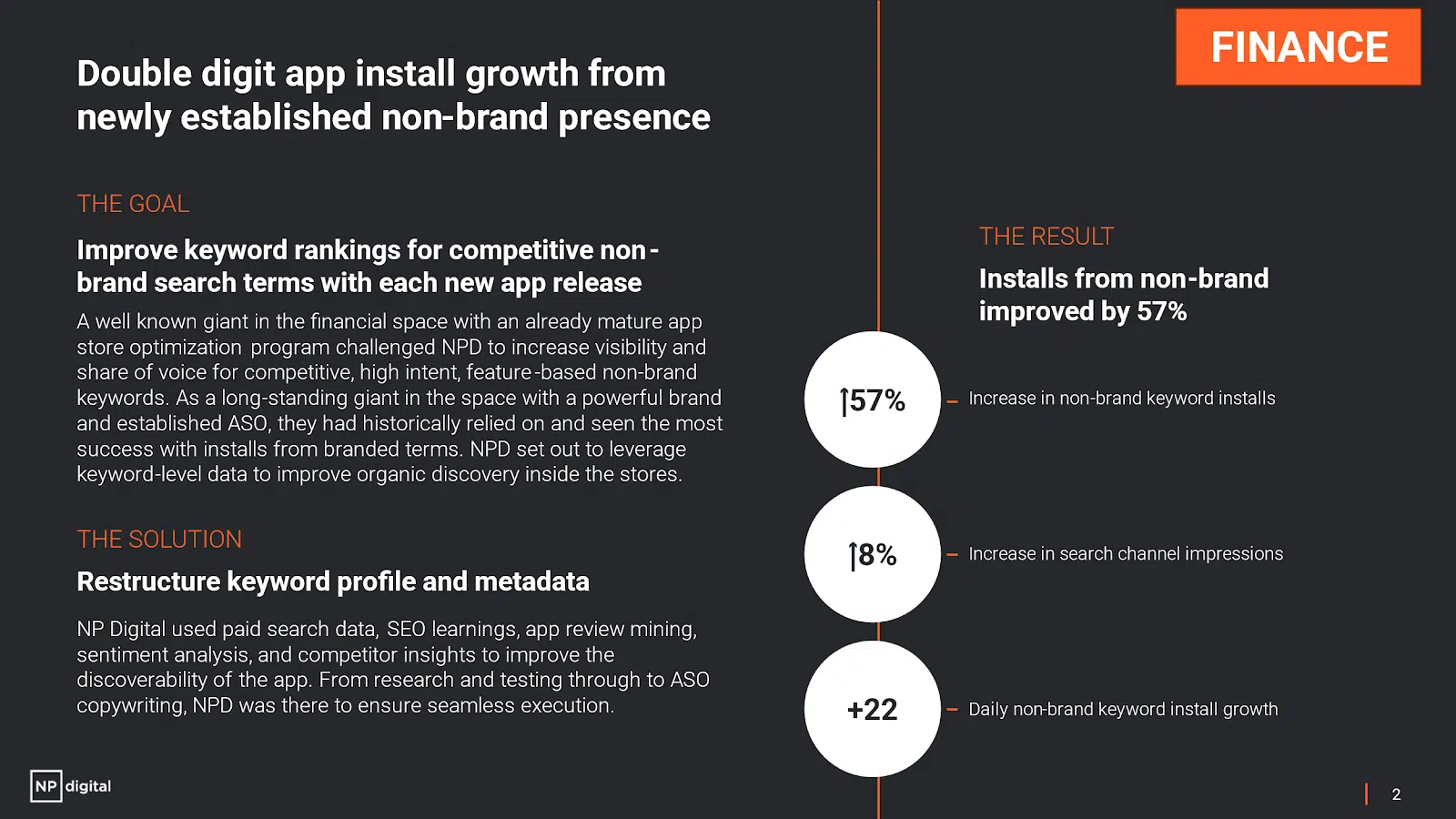
The 57% increase our client saw for non-branded app downloads came from a strategy rooted in SEO principles. Most of the campaign’s ASO keyword ideas came from the client’s website, including their app landing page.
Focusing on basic information and strategies like keyword-level data and metadata restructuring enabled success in a highly competitive environment.
7. ASO meta optimization
Finding keywords where your competitors have stronger visibility also gives you a lot of consideration for optimizing your ASO metadata across the Apple App and Google Play stores.
For example, you see below that Remitly’s App Store listing is ranking number 1 on Google for “wire transfer app,” while Western Union is ranking number 10.
When looking at each of their listings, you can see Remitly uses “wire” in their App Store description, while Western Union does not.
Remitly:
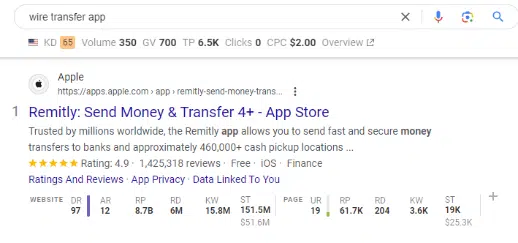
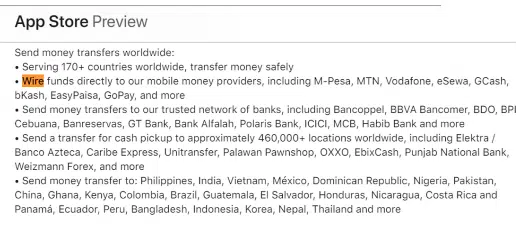
Western Union:

Similar to traditional SEO, if you want your store listing page to rank well on Google for certain terms, you must understand what people are searching for and ensure the right keywords are integrated into your store listing metadata.
8. Backlinks
While backlinks aren’t a factor in the Apple App Store, they are in the Google Play Store.
Conducting competitive backlink research and finding ways to gain mentions across the web is a task you should be doing for SEO and ASO.
Here are a few tips to get you started with backlinking strategy.
Competitive conquesting
An effective competitive conquesting strategy starts by researching round-ups and listicle articles mentioning your industry’s apps.
Try to find articles where your app isn’t listed and pitch the author why they should include it and link to your app listings.
When you reach out, you’ll provide the same information for your app in the same format and with the same details as the other apps in the article.
For example, Centr’s fitness app isn’t listed in the Forbes roundup below. Reaching out to Forbes with information about the app’s cost, whether it offers live classes, whether it has heart rate monitoring, a list of its best features and its overall pros and cons (the five key pieces of information provided for the 10 apps featured) makes it easy for Forbes to add them in.

PR pitching
Taking the PR angle has the same result as competitive conquesting, except you’re not trying to get into existing articles.
Your goal with PR pitching is to provide the latest information about your app for a journalist to include in a new article.
Instead of targeting the best fitness apps, you could focus on different audiences or timely use cases, such as the best fitness apps for women or the best fitness apps for beginners. With this approach, you’re creating a reason why a journalist would want to write this story.
Be sure to include data on why the story is relevant now and pitch it a few months ahead of the theme. For example, you could pitch your app as one of the best fitness apps for women in March so a journalist has time to finalize their story before Women’s Health Month in May.
Forums and discussions
Answer consumer questions related to your app in forum communities like Quora and Reddit.
Link directly to where users can find your app in the app stores in your answers. This helps consumers with their direct questions and increases the app’s chance of ranking in the forums and discussions featured within Google SERPs.
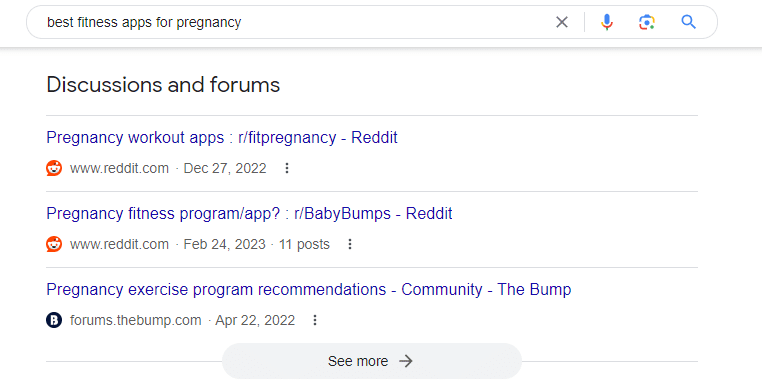
Harness SEO basics to boost your app downloads
While ASO is quite a different practice than SEO, many principles apply to both disciplines. If you’re struggling to boost your app’s performance, taking things back to basics may be a good idea.
Approach your app store listing pages and landing page from an SEO perspective and improve their fundamental aspects like keyword optimization.
Couple this with your other sound ASO tactics and you may be surprised by your new download numbers.
Opinions expressed in this article are those of the guest author and not necessarily Search Engine Land. Staff authors are listed here.
Source link : Searchengineland.com
